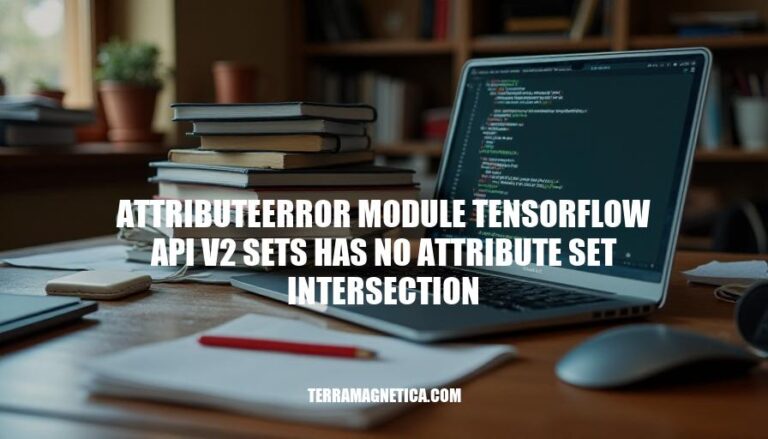


The error AttributeError: module 'tensorflow._api.v2.sets' has no attribute 'set_intersection' occurs in TensorFlow 2.x environments. This happens because the set_intersection function was renamed to intersection in TensorFlow 2.x. To resolve this, you should use tf.sets.intersection instead of tf.sets.set_intersection.
The AttributeError: module 'tensorflow._api.v2.sets' has no attribute 'set_intersection' occurs due to changes in TensorFlow’s API from version 1.x to 2.x. Here are the specific reasons:
Function Renaming: In TensorFlow 1.x, the function was named tf.sets.set_intersection. In TensorFlow 2.x, it was renamed to tf.sets.intersection.
Compatibility Module: TensorFlow 2.x introduced a compatibility module tf.compat.v1 to allow the use of TensorFlow 1.x functions. If you need to use the old function name, you can access it via tf.compat.v1.sets.set_intersection.
Eager Execution: TensorFlow 2.x uses eager execution by default, which changes how functions and operations are executed. This can affect how certain functions are called and used.
API Cleanup: TensorFlow 2.x removed or renamed several functions to streamline the API and make it more consistent. This includes the renaming of set_intersection to intersection.
These changes require updating code written for TensorFlow 1.x to be compatible with TensorFlow 2.x.
Users commonly encounter the AttributeError: module 'tensorflow._api.v2.sets' has no attribute 'set_intersection' error in the following scenarios:
Model Training: When attempting to train models, especially those involving complex architectures like Mask R-CNN, users might face this error due to compatibility issues between TensorFlow versions and the code being used.
Inference: During the inference phase, particularly when loading pre-trained models or running predictions, this error can occur if the code references deprecated or renamed functions in TensorFlow.
Version Mismatch: This error often arises from using TensorFlow 2.x code that still calls functions from TensorFlow 1.x, which have been renamed or removed in the newer version.
Here are detailed solutions and workarounds for resolving the AttributeError: module 'tensorflow._api.v2.sets' has no attribute 'set_intersection' error:
tf.compat.v1.sets.set_intersectionIf you are using TensorFlow 2.x but want to use the TensorFlow 1.x API, you can use the compatibility module:
import tensorflow as tf
# Use the compatibility module
intersection = tf.compat.v1.sets.set_intersection(set1, set2)
In TensorFlow 2.x, the function has been renamed. Use tf.sets.intersection instead of tf.sets.set_intersection:
import tensorflow as tf
# Correct function in TensorFlow 2.x
intersection = tf.sets.intersection(set1, set2)
If you encounter issues with dense tensors, you can use sparse tensors and convert them to dense:
import tensorflow as tf
# Create sparse tensors
sparse_set1 = tf.sparse.SparseTensor(indices=[[0, 0], [1, 2]], values=[1, 2], dense_shape=[3, 4])
sparse_set2 = tf.sparse.SparseTensor(indices=[[0, 1], [2, 3]], values=[1, 3], dense_shape=[3, 4])
# Perform intersection
intersection = tf.sets.intersection(sparse_set1, sparse_set2)
# Convert to dense
dense_intersection = tf.sparse.to_dense(intersection)
If the above solutions do not work for your specific use case, you can downgrade TensorFlow to a version where tf.sets.set_intersection is available:
pip install tensorflow==1.15
If none of the above solutions are suitable, you can implement your own set intersection function:
import tensorflow as tf
def custom_set_intersection(set1, set2):
set1 = tf.convert_to_tensor(set1)
set2 = tf.convert_to_tensor(set2)
intersection = tf.sets.intersection(set1, set2)
return intersection
# Example usage
set1 = [[1, 2, 3], [4, 5, 6]]
set2 = [[2, 3, 4], [5, 6, 7]]
result = custom_set_intersection(set1, set2)
These solutions should help you resolve the AttributeError and continue with your TensorFlow project.
Here are some preventive measures:
tf.compat.v1 for backward compatibility.These steps should help you avoid such errors in future projects.
Consider the following solutions:
Upgrade TensorFlow: Ensure you’re using the latest version of TensorFlow, as deprecated APIs are often removed in newer versions.
Use Compatibility Modules: Utilize tf.compat.v1 for backward compatibility with older APIs.
Custom Implementation: Implement your own set intersection function if the desired functionality is not available in the current TensorFlow API.
Keep TensorFlow updated to the latest version.
Review TensorFlow’s release notes for any API changes.
Use compatibility modules like tf.compat.v1 for backward compatibility.
Implement automated tests to catch deprecated API usage early.
Engage with TensorFlow’s community for updates and best practices.
Regularly check the official documentation and release notes to ensure you’re using the most up-to-date features and APIs.